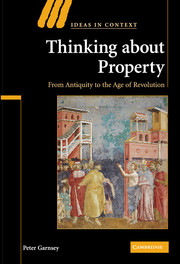Book contents
- Frontmatter
- Contents
- Abbreviations
- Preface
- Introduction
- Chapter 1 Plato's ‘communism’, Aristotle's critique and Proclus' response
- Chapter 2 Plato's ‘communism’: from late antiquity via Islamic Spain to the Renaissance
- Chapter 3 Renunciation and communality: thinking through the primitive Church
- Chapter 4 The poverty of Christ: crises of asceticism from the Pelagians to the Franciscans
- Chapter 5 The state of nature and the origin of private property: Hesiod to William of Ockham
- Chapter 6 The state of nature and the origin of private property: Grotius to Hegel
- Chapter 7 Property as a legal right
- Chapter 8 Property as a human right
- Conclusion
- Bibliography
- Index
Chapter 8 - Property as a human right
Published online by Cambridge University Press: 22 September 2009
- Frontmatter
- Contents
- Abbreviations
- Preface
- Introduction
- Chapter 1 Plato's ‘communism’, Aristotle's critique and Proclus' response
- Chapter 2 Plato's ‘communism’: from late antiquity via Islamic Spain to the Renaissance
- Chapter 3 Renunciation and communality: thinking through the primitive Church
- Chapter 4 The poverty of Christ: crises of asceticism from the Pelagians to the Franciscans
- Chapter 5 The state of nature and the origin of private property: Hesiod to William of Ockham
- Chapter 6 The state of nature and the origin of private property: Grotius to Hegel
- Chapter 7 Property as a legal right
- Chapter 8 Property as a human right
- Conclusion
- Bibliography
- Index
Summary
INTRODUCTION
When Aristotle was launching his enquiry into the end of political science, he resolved to consider first the opinions of ordinary people rather than philosophers, or at least ‘those [opinions] which are most prevalent or have something to be said for them’. Taking a leaf out of his book, I begin with a quotation from the Guardian of 10 January 2007:
Isn't it funny how quickly new human rights get established? Once upon a time we used to make do with the right to life and property. Then came the right to drive (at any speed), and, more recently still, the right to fly (any distance). A generation ago, most people would have been content to plod along to Weston-super-Mare and hope for some August sun. Now a long-haul flight to Thailand or Barbados is such a God-given birthright that the prime minister himself thinks it is ‘a bit impractical’ to ask families to consider holidaying closer to home for the sake of something so unimportant as global climate.
My interest is less in the proliferation and trivialization of human rights in the modern world (to which this citation bears eloquent witness), than in the representation of property as an established natural right, worthy company for the right to life itself. In this chapter I put this judgement or assumption to the test with the aid of philosophers, theologians, jurists and politicians from the middle of the twelfth century to the end of the eighteenth.
- Type
- Chapter
- Information
- Thinking about PropertyFrom Antiquity to the Age of Revolution, pp. 204 - 232Publisher: Cambridge University PressPrint publication year: 2007

